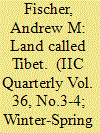| Srl | Item |
| 1 |
ID:
128512


|
|
|
| 2 |
ID:
159846


|
|
|
|
|
| Summary/Abstract |
Based on an entirely unexplored source of data, this paper analyses the evolution of Tibetan representation and preferentiality within public employment recruitment across all Tibetan areas from 2007 to 2015. While recruitment collapsed after the end of the job placement system (fenpei) in the early to mid-2000s, there was a strong increase in public employment recruitment from 2011 onwards. Tibetans were underrepresented within this increase, although not severely, and various implicit practices of preferentiality bolstered such representation, with distinct variations across regions and time. The combination reasserted the predominant role of the state as employer of educated millennials in Tibetan areas to the extent of re-introducing employment guarantees. We refer to this as the innovation of a neo-fenpei system. This new system is most clearly observed in the Tibet Autonomous Region (TAR) from 2011 to 2016, although it appears to have been abandoned in 2017. One effect of neo-fenpei, in contrast to its predecessor, is that it accentuates university education as a driver of differentiation within emerging urban employment. The evolution of these recruitment practices reflects the complex tensions in Tibetan areas regarding the overarching goal of security and social stability (weiwen) emphasized by the Xi–Li administration, which has maintained systems of minority preferentiality but in a manner that enhances assimilationist trends rather than minority group empowerment.
|
|
|
|
|
|
|
|
|
|
|
|
|
|
|
|
| 3 |
ID:
139546


|
|
|
|
|
| Summary/Abstract |
This study estimates the extent of subsidization in the ten provinces of western China from 1990 to 2012 with the aim of highlighting the exceptionality of the Tibet Autonomous Region (TAR) leading up to and following the widespread Tibetan protests that swept through four Chinese provinces in 2008. Although the Tibet development model was criticized by many Chinese economists in the 1980s and 1990s for being highly subsidy-dependent and inefficient, these aspects of dependence and inefficiency were exacerbated even further under the Hu–Wen administration, particularly following the 2008 protests. While subsidies and investment also increased in other western provinces, the exceptionality of the TAR stands out in terms of the levels of subsidization attained, the sheer disassociation of these subsidies from changes in the local productive economy, and the degree to which ownership in the local economy has come to be dominated by external interests. The recent phase of intensive subsidization has thereby exacerbated the dependence of local Tibetan livelihoods on these state strategies, while at the same time intensified the state-led economic integration of the region into the rest of China through externalized patterns of ownership and consolidated state control. Arguments that the resultant inefficiencies and social tensions are owing to a marketization of social relations or to cultural insensitivity and lack of adaptation to local circumstances de-emphasize the central role of the state in shaping the deeply structural character of these transformations.
|
|
|
|
|
|
|
|
|
|
|
|
|
|
|
|